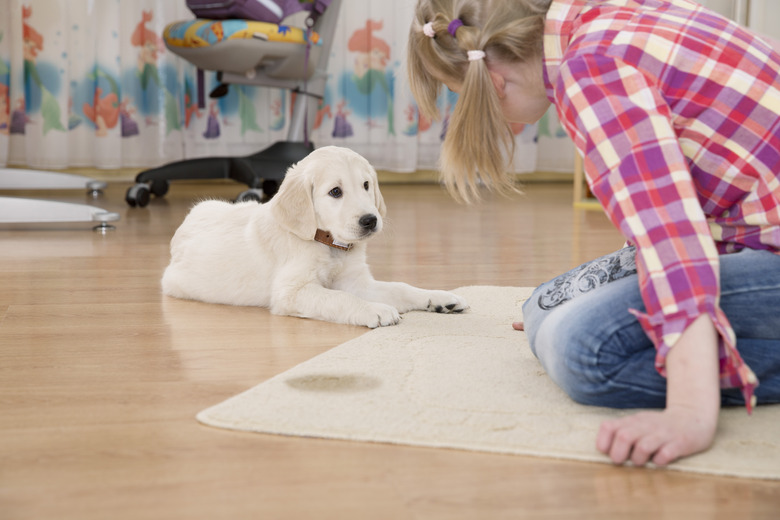Is The Smell Of Dog Urine In A House Bad For You?
Owning a dog, especially a puppy, means dealing with indoor pet "accidents" from time to time. Some small dogs pee a little when excited, and it takes time for puppies to learn that urinating is supposed to be an outdoor activity. In any case, the sooner you clean up after your four-legged friend, the better, as dog urine odor could cause health issues in some situations.
Breathing in dog urine fumes
Breathing in dog urine fumes
If your dog has an accident while you're away, you might notice the aroma as soon as you enter the home. Dog urine smells like ammonia because it actually contains ammonia. Even human urine has ammonia in it, but the concentration is much stronger in dog and cat pee. Ammonia is a lung irritant and could exacerbate symptoms for those with asthma, allergies, or COPD. While those little accidents that occur while potty training a puppy probably aren't enough to cause health concerns, frequent indoor pet urination could be a problem. As the urine evaporates, the ammonia odor could get stronger and permeate carpet, floors, and subflooring, rugs, and upholstery, especially if not cleaned up right away. The side effects of breathing in dog urine ammonia include headaches, nausea, and a burning sensation in the eyes, nose, or throat.
Dangers of dog urine contact
Dangers of dog urine contact
When cleaning up dog urine indoors, always wear rubber gloves. Do youR best to avoid touching the urine, as pathogens within it could cause health problems, especially if you have a compromised immune system. Kidney and liver damage, fever, fatigue, vomiting, and diarrhea are a few of the problems caused by rare forms of bacteria thriving in pet urine. If you do come into contact with dog urine, wash the affected area immediately. Again, serious health issues resulting from urine contact rarely happen, but it's best to know about them and take precautions during pet cleanup duty.
When the smell is intense
When the smell is intense
Regularly keeping numerous pets locked indoors for extended periods of time increases the likelihood of pet-related odors inside, especially near cages. Such situations cause intense, overpowering odors that make it nearly impossible to avoid breathing in dog urine fumes. If dealing with such a home, and you know about the potential for odor ahead of time, wear a respirator that blocks organic vapors. Respirators come in many varieties designed to protect against specific issues such as fine particles, mold, or chemicals, so be sure to read the package thoroughly to ensure you buy the right type.
Once indoors, open all the windows immediately and turn on fans to help ventilate the space. Discard any rugs, pet bedding, puppy pads, or other materials soiled with urine or feces. In some cases, sofa cushions, mattresses, and similar furnishings may have to be discarded or at very least, taken outdoors to air out before cleaning.
Dogs may urinate in the same area repeatedly, which damages carpeting and even the flooring beneath it. Pull up the carpet and pad, discarding both, in any rooms subjected to major amounts of urine. If the subflooring beneath the carpet pad is severely damaged, the affected area should be replaced as well, as it's nearly impossible to remove all of the odor and ammonia residue absorbed within the material. If the spots on the flooring or subflooring are relatively small and minor, spritzing them with white vinegar or an enzymatic cleaner removes odor. Deodorizing and cleaning may require several treatments.
